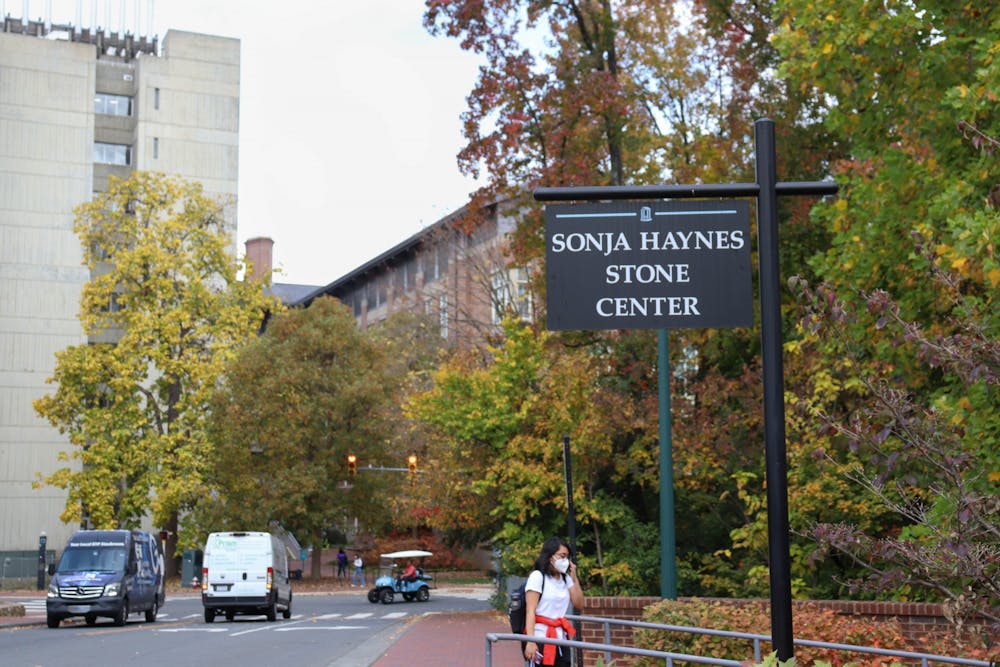At the 31st annual Sonja Haynes Stone Memorial Lecture on Tuesday, Yale University professor Erica Edwards discussed her in-progress novel about untold stories in history — specifically those of Black women.
Every fall, the Sonja Haynes Stone Center for Black Culture and History invites a female lecturer to UNC's campus whose work, scholarship and service epitomizes the vision and spirit of Stone herself. This year's director of the Stone Center, LeRhonda Manigault-Bryant, said she chose Edwards because of her activism.
“She's been doing some really great work as both an advocate but also an expert on the ways that Black feminism intersects with literature, social movements, popular culture and politics,” Manigault-Bryant said.
Edwards teaches African American Studies and English at Yale and is an author of multiple books, including "The Other Side of Terror: Black Women and the Culture of the US Empire."
At the event, Krystal Lacayo, UNC junior and Sean Douglas Leadership fellow, spoke about the life and legacy of Stone.
“Dr. Stone’s accomplishments, memory and honor transcends me and transcends time,” she said. “A trailblazer in every sense, I understand her work is not done as it lies in the hands of you and I. Everything we do should be in community with one another led by genuine curiosity and love.”
The lecture took the audience on a journey through readings, maps and photographs about the focus of the novel Edwards is currently working on titled "Open Air." Edwards explained that "Open Air" is set during the Civil War in Arlington County, Va., in Union territory and it will focus on the stories of “contraband.”
“That was the name given to the fugitives — property who had liberated themselves from enslavers,” she said. “People who have left their plantations and occupied territory, where they built communities, cultivated lands and reconstituted themselves and their families."
Edwards added that the term "contraband" was a new way of labeling enslaved people, who had escaped, as not fully human.
She described the open-air shelters in Arlington for Black people during the cold winter months. Edwards also shared the thoughts of a woman living at a Union camp, where she watched soldiers develop relationships with the Black women of the camps. She also spoke about the performances Black singers had to give for former President Abraham Lincoln when he frequently visited their camp.
Lacayo said Edwards focuses on these perspectives unrepresented in history. She added that Edwards creates fictional stories and characters, but they are rooted in the realities of history.
Lacayo also said she believes Edwards embodies the quote, “The lack of, is the opportunity for.” Manigault-Bryant said this annual lecture serves as a platform for underrepresented voices in history.
A senior work-study student at the Stone Center, Natalia Adamah, said that Edwards writes the "forgotten" voices who were directly written out of history because others didn’t want their stories to be heard.
“I feel like she's very good at bringing attention to and giving people insight to these stories they might not otherwise have heard because they're not in the spaces, institutions and systems that we have today,” she said. “They're not telling the stories — they want the stories to be forgotten.”
Lacayo said this lecture was needed at UNC to ensure people hear beyond their own histories, perspectives and understandings, as well as to inspire people to take action for racial equality.
“Professor Edwards gave us a very insightful ideology that Black women are invisible," she said. "Invisible in the historical sense and in the present day — and will be visible in the future.”
Adamah said the event gave her a sense of community. Even though traumatic and horrific stories were shared, she said she felt safe knowing there were other Black women in the room with common experiences.
“At times, being at UNC, I sometimes don't feel like I belong here,” she said. “But being in that room and being surrounded by intellectual Black women — like myself — and having that connection and hearing these stories. It felt very — what's the word? I felt safe.”



